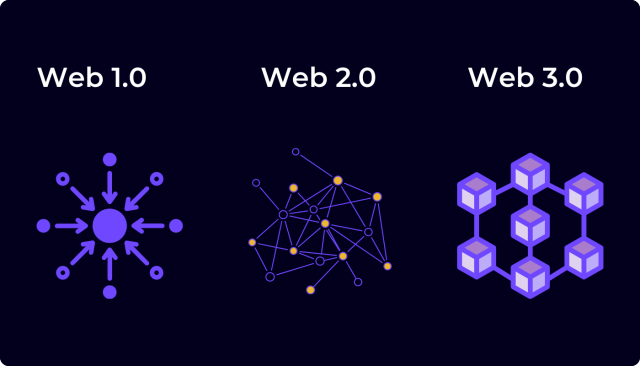The Future in the New Digital Age: Web3 and Blockchain
- Posted on January 12, 2023
- Blockchain
- By Mark Otto
- 427 Views
The shift to the new digital age, Web3, is unavoidable and much closer than it appears above the mountains. From individuals to businesses, the sooner we face it, the faster we can adapt and gain a competitive advantage.

The shift to the new digital age, Web3, is unavoidable and much closer than it appears above the mountains. From individuals to businesses, the sooner we face it, the faster we can adapt and gain a competitive advantage. SO LET'S LOOK AT WEB1 AND WEB2 FIRST TO REALLY UNDERSTAND WHAT WEB3 IS. WHAT DOES IT THEREFORE OFFER US?
WEB1 was created to enable companies to write and regular customers to read. It was the era of Internet access via a browser. Web2 is a more interactive version. Internet users may now express themselves online thanks to technological innovation. The sharing of comments on websites, social networking and distribution, and the adoption of smartphones define this age. And although WEB1 was primarily for businesses, WEB2 was for community development. It started with forums and blogs, then moved on to social media, messengers, and TikTok. As a result, the user's position evolved from that of a passive reader to that of an active part. Although we are going toward WEB3, we are still in WEB2, which has a lot of room to grow.
To grasp what web3 is, one must first embrace the idea of decentralization, which is fundamental to web3.
Decentralization
Imagine a future where no middlemen are required for credit ownership, data storage, or money transfers between individuals. Decentralization is the process of distributing authority and control away from a single party or a limited number of individuals. Decentralization is a term frequently used to describe how information, computing power, and decision-making are distributed throughout a network of devices or people in the context of technology.
The likelihood is that we are currently utilizing Web3 technology without recognizing it; the most obvious example is Bitcoin, the first cryptocurrency. Although the term was created in 2014, the origins of web3 may be traced back to 2009 with Satoshi Nakamoto's mining of Genesis Block, the first block of blockchain-based Bitcoin ever mined.
DeFi
Decentralized Finance (DeFi) refers to a new financial system built on blockchain technology that operates without the need for traditional intermediaries like banks, credit card companies, or stock exchanges. DeFi allows for the creation of decentralized financial products and services that can be accessed by anyone with an internet connection, regardless of location.
As of right now, there are hundreds of cryptocurrencies, and more are being made all the time. Most of these cryptocurrencies, also known as "altcoins," are variants of the original cryptocurrency, Bitcoin. They share many characteristics, including being decentralized and utilizing blockchain technology. In addition to Bitcoin, other well-known cryptocurrencies include Ethereum, Dogecoin, and Litecoin.
Decentralized finance (DeFi) promotes decentralizing the financial economy, with no central bank or governing center. This is made possible through a technology known as Blockchain, a digital archive storing information about funds and their movement.
Blockchain will totally revolutionize not only the financial industry as a whole, but the whole economic environment, from supply chains to show biz.
Healthcare
Blockchain has the potential to change healthcare administration as well. A centralized system, for example, permits doctors in one country's hospitals to exchange medical information. What if you go to a clinic in another country? That involves extra paperwork and lost time. Consider placing your medical records and medical history on Blockchain, which would allow you to securely store and interchange data with healthcare practitioners all over the world in minutes.
Furthermore, how cryptography (the science of encrypting information) and Blockchain function will make a patient's medical data more private than ever before. Medical privacy is protected, and no other party will have access to it.
Supply Chain
People nowadays are more wary customers than they were decades ago. In this regard, Blockchain can provide users with information about the products and services they utilize. Businesses will include a QR code on their goods to educate customers on the item's composition. A consumer may scan a QR code on a product to learn more about its composition or to examine the whole supply chain. It will also assist the firm in verifying that all third-party supplies are on time and transparent, allowing a corporation to handle any delays or raw material problems. As a result, it will give the individual independence and freedom of choice while also giving the company control over its product roadmap.
NFTs (non-fungible tokens)
NFT- the most overused phrase in the second half of 2021 and 2022. But what exactly is it? In a nutshell, it's a Blockchain-registered public certificate of ownership. A digital property file accessible over the Internet. This creates several chances for corporations and individual investors, ranging from gaming to real estate to art. NFT e-commerce systems and NFT markets for exchanging lands, arts, music, and films are created by developers. NFTs have the potential to provide a solution to ownership and credit issues. It will provide an opportunity for creative individuals to own their ideas.
Metaverse
NFTs are pretty widely used in Metaverses, a virtual shared space. It is a simulation of the universe in which people can interact in real-time using avatars. It has potential applications in fields such as entertainment, education, and business.
Gaming
Blockchain, NFT, and play-to-earn games have promising futures in the gaming sector. NFTs are in-game assets like guns and equipment in some games, and players must take specific activities to gain rewards in cryptocurrency.
Democracy
NFTs play a huge role also for democracy. One of the key opportunities presented by Blockchain and Web3 is the ability to create more inclusive and democratic systems of governance and participation. By enabling peer-to-peer transactions and decentralized decision-making, these technologies can empower individuals and communities to take control of their own data and assets and to collaborate and coordinate more effectively without the need for intermediaries or central authorities. This can democratize access to information, resources, and power and create new forms of social and economic organization that are more resilient and responsive to the needs and preferences of their members.
In conclusion, the world has a lot to gain from blockchain and Web3 technologies, which have the potential to revolutionize a variety of businesses and applications. With the help of this technology, everyone may look forward to a more equitable and prosperous future.
The potential for realizing the ideas mentioned above can be accomplished through the combined efforts of software engineers and blockchain specialists in advanced blockchain companies. One notable instance is Codeex, displaying the capability of these companies to make these concepts a reality.



